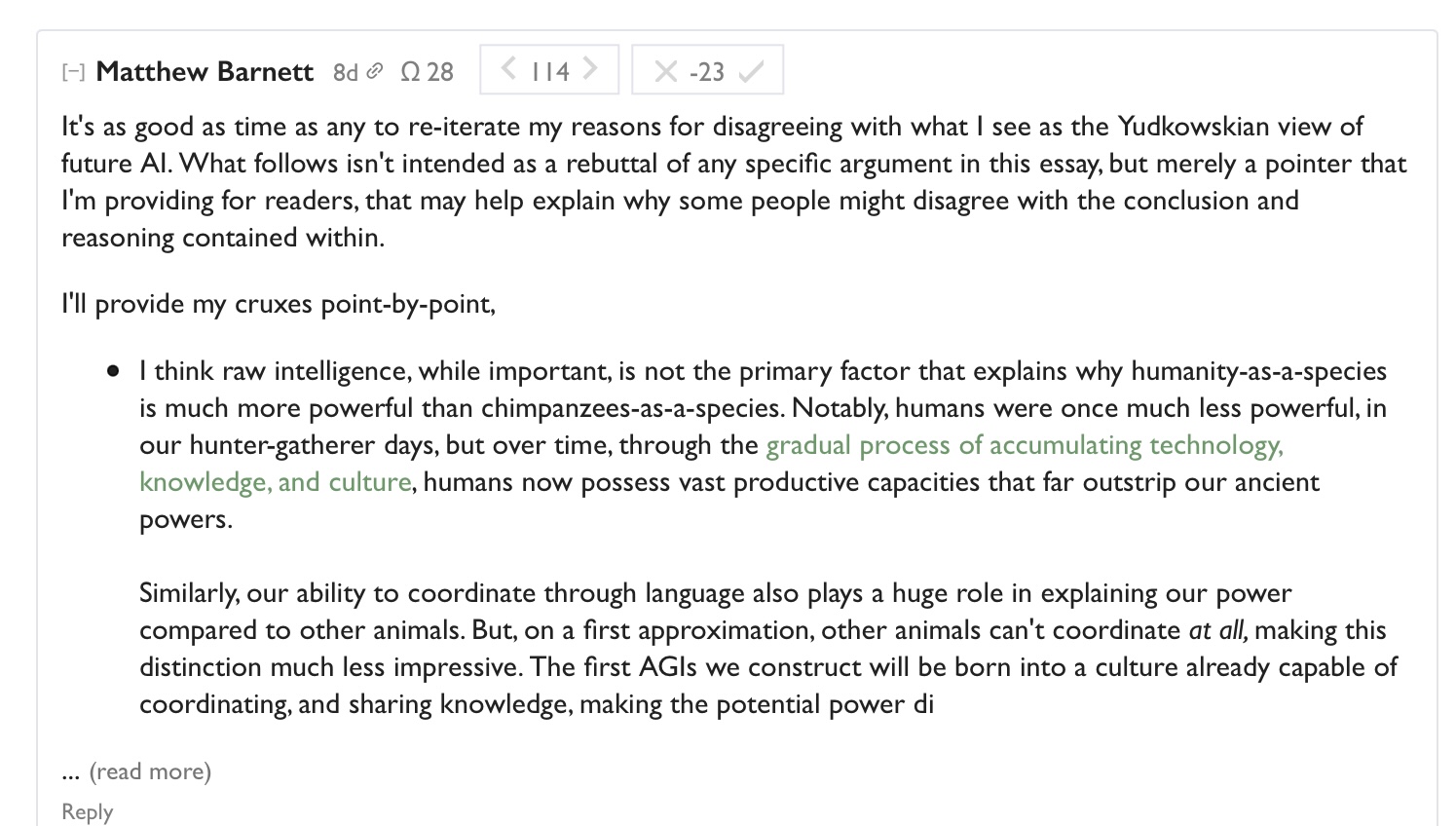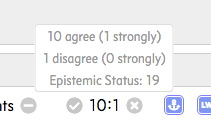Starting today we're activating two-factor voting on all new comment threads.
Now there are two axes on which you can vote on comments: the standard karma axis remains on the left, and the new axis on the right lets you show much you agree or disagree with the content of a comment.

How the system works
For the pre-existing voting system, the most common interpretation of up/down-voting is "Do I want to see more or less of this content on the site?" As an item gets more/less votes, the item changes in visibility, and the karma-weighting of the author is eventually changed as well.
Agree/disagree is just added on to this system. Here's how it all hooks up.
- Agree/disagree voting does not translate into a user's or post's karma — its sole function is to communicate agreement/disagreement. It has no other direct effects on the site or content visibility (i.e. no effect on sorting algorithms).
- For both regular voting and the new agree/disagree voting, you have the ability to normal-strength vote and strong-vote. Click once for normal-strength vote. For strong-vote, click-and-hold on desktop or double-tap on mobile. The weight of your strong-vote is approximately proportional to your karma on a log-scale (exact numbers here).
Ben's personal reasons for being excited about this split
Here's a couple of reasons that are alive for me.
- I personally feel much more comfortable upvoting good comments that I disagree with or whose truth value I am highly uncertain about, because I don’t feel that my vote will be mistaken as setting the social reality of what is true.
- I also feel very comfortable strong-agreeing with things while not up/downvoting on them, so as to indicate which side of an argument seems true to me without my voting being read as “this person gets to keep accruing more and more social status for just repeating a common position at length”.
- Similarly to the first bullet, I think that many writers have interesting and valuable ideas but whose truth-value I am quite unsure about or even disagree with. This split allows voters to repeatedly signal that a given writer's comments are of high value, without building a false-consensus that LessWrong has high confidence that the ideas are true. (For example, many people have incompatible but valuable ideas about how AGI development will go, and I want authors to get lots of karma and visibility for excellent contributions without this ambiguity.)
- There are many comments I think are bad but am averse to downvoting, because I feel that it is ambiguous whether the person is being downvoted because everyone thinks their take is unfashionable or whether it's because the person is wasting the commons with their behavior (e.g. belittling, starting bravery debates, not doing basic reading comprehension, etc). With this split I feel more comfortable downvoting bad comments without worrying that everyone else who states the position will worry if they'll also be downvoted.
- I have seen some comments that previously would have been "downvoted to hell" are now on positive karma, and are instead "disagreed to hell". I won't point them out to avoid focusing on individuals, but this seems like an obvious improvement in communication ability.
I could go on but I'll stop here.
Please give us feedback
This is one of the main voting experiments we've tried on the site (here's the other one). We may try more changes and improvement in the future. Please let us know about your experience with this new voting axis, especially in the next 1-2 weeks.
If you find it concerning/invigorating/confusing/clarifying/other, we'd like to know about it. Comment on this post with feedback and I'll give you an upvote (and maybe others will give you an agree-vote!) or let us know in the intercom button in the bottom right of the screen.
We've rolled it out on many (15+) threads now (example), and my impression is that it's worked as hoped and allowed for better communication about the truth.

appreciation for high-quality comments that many users disagree with.





This comment is an experiment. I'm trying out a variant of the proposed idea of voting by headings/block quotes: this comment contains my comment, and the replies below contain claims extracted from my comment for agree/disagree voting.
Agree/disagree buttons incentivizes knee-jerk, low-effort reactions rather than deliberate, high-effort responses
Something I like about LW's system of upvotes meaning "things you want to see more of" and having no agree/disagree button is that there's no simple way of expressing agreement or disagreement. This means that when there's something I disagree with, I'm more incentivized to write a comment to express it. That forces me to think more deeply because I need to be able to state clearly what it is I'm agreeing or disagreeing with, especially since it can be quite nuanced. It also feels fairer because if someone went to the effort of writing a comment, then surely it's only fair that I do likewise when disagreeing. (Unless of course it was a low effort comment, in which case I could always just downvote.)
I suspect that if there's an agree/disagree button, the emotional part of me would be satisfied with clicking the disagree button, whereas currently, it pushes me to express my disagreement as a (thought-through, reasoned) reply. I aspire to be someone who responds thoughtfully, but that is not an instinctive behavior. With the disagree button available, I would be fighting instinct rather than working with it. It encourages emotional, knee-jerk reactions rather than deliberate responses.
(It's nice to be able to get a rough gauge of the community's opinion of a statement though. It's not of much practical use in terms of evaluating the truth of a statement, because I prefer to weight different people's opinions differently based on the topic, but it does give a general sense of the community's opinion.)
Agree/disagree buttons are confusing or even harmful for comments that are making multiple claims
There are Telegram channels by news agencies where they post messages for articles. Each message contains a headline and a link to the article, and people would then react to the chat message using emojis. It's quite amusing when there are headlines like "Person X convicted of Y and sentenced to Z" and you see many thumbs up and thumbs down. It makes me wonder, are you showing approval/disapproval for the crime, the conviction, or the punishment? It also seems to contribute to typical mind fallacy/confirmation bias problems.
Similarly, having agree/disagree buttons on comments that have multiple claims doesn't really make sense, because we can't tell which part is being agreed/disagreed with and people might end up interpreting the votes according to their own beliefs.
Suggested alternative: agree/disagree buttons for claims created specifically for voting
Others have suggested allowing voting per heading or by block quote but I think that the way I phrase my comments is different from how I would craft a claim. Also, some statements aren't meant for people to evaluate (e.g. sharing of personal stories, giving encouragement, sharing related posts).
Thus, one possibility I can think of is to let users create claims specifically for agree/disagree voting. Other users (besides the author) can also add in separate claims extracted from the comment. Hopefully, when claims are designed to be agreed/disagreed with, it makes the agree/disagree votes easier to interpret. (Ideally, there should probably be a third option that says "this is not a statement that can be meaningfully agreed/disagreed with" or "this is not a well-crafted statement".)
Thoughts after trying it out
Claim 2: Agree/disagree buttons are confusing or even harmful for comments that are making multiple claims. This is significant enough that there should not be an agree/disagree button for comments where agree/disagree buttons are not suitable.
- Agree: The negative consequences are significant enough that there should not be agree/disagree buttons for certain types of comments. For example, authors may be able to decide if they will allow agree/disagree votes on their comment.
- Disagree: It is acceptable to have agree/disagree votes even for posts/comments whe
... (read more)